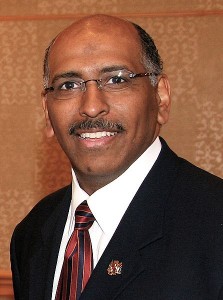|
For anyone who doesn’t known someone in 12-step recovery or who doesn’t have a folk-wisdom-spouting Bubbe (or Nona or Grammy or Nana, etc.), “the definition of insanity is doing the same thing and expecting a different result.” This perhaps-overused aphorism has so many useful applications, I won’t bore you with too many. (Let’s just say in our house, it applies to everything from why I don’t keep Reese’s Peanut Butter Cups in the house, to our current search for an alarm clock guaranteed to wake a 17-year-old boy.) In politics, however, very few people seem to follow this wisdom. I imagine it’s partially because everyone is ‘preaching to the choir’ (another folk aphorism, although not one I ever heard from any Bubbe, which is Yiddish for Grandma . . . but I digress). That is, public figures mostly give speeches to please the people who already agree with them, which makes sense – constituents or fans know what to expect, and it also makes life much easier for political comedy writers who all start salivating whenever Donald Trump says he’s going to make any kind of announcement. The insanity of repetition gets a bit out of control when it comes to legislation. It’s one thing for gun control advocates to come up with a variety of new laws, or for abortion foes to get creative in how they make it difficult for clinics to stay open – whether you agree or disagree, at least those groups are trying to adapt to reality instead of doing the same thing over and over. But what’s with the 40 votes to repeal the Affordable Care Act? On top of the fact that it’s getting to be a punch line, and these repeal votes are clearly fruitless, it does seem somewhat hypocritical for a supposedly fiscal conservative bunch to be wasting so much time and taxpayer money. (According to a CBS estimate, based on nonpartisan data about the cost of a congressional work week, each repeal vote costs $1.45 million, which makes the total over $50 million so far.) I don’t even want to think about how $50 million compares to my financial situation . . . but at least, on the brighter side, it makes the expenses for my college-bound son seem pretty reasonable by comparison. At a certain point, it’s prudent to give up fighting and ‘surrender, Dorothy’ – so to help the GOP get unstuck, here’s a musical reminder that “Obamacare Isn’t Scary!”
Great question. The answer depends on why you decided to work for the politican in the first place. If you are an idealist who was inspired by the candidate when you first met him/her and thus decided to apply for a job, then I think you should probably leave, since the work appears to be a disheartening, compromising experience. If, on the other hand, you took the job because you saw it as a good way to get where you want to be, then you should probably stay, so long as the job continues to serve that purpose. No candidate is as wonderful as his staunchest supporters imagine or as awful as his fiercest opponents allege. Paul Wellstone, the first politician I ever “fell for,” voted for the Defense of Marriage Act in 1996 as he faced a tough re-election battle. While I understood the political context, his vote disappointed me. (He later apologized and said he regretted the vote.) Conversely, John Ashcroft, whom I reviled as a U.S. senator and attorney general, ultimately made a very courageous decision, standing up to White House Counsel Alberto Gonzales and Chief of Staff Andrew Card regarding a domestic surveillance decision as he lay on what he thought was his deathbed. I try to keep these examples in mind before falling too hard for—or harshly condemning—any politician. Q: So, dude, I’m a former high school teacher and I keep getting Facebook friended by girls I taught who have become WAY hot. So here’s the thing: I’m hoping to run for office next year and my question is, is it okay for me to message them to ask for help with my campaign, or will it totally creep them out? —Hot for Student, Somewhere in the Midwest So, dude, maybe you haven’t been keeping up with the news, but have you heard of this guy named Anthony Weiner? Yeah, because you make him sound classy. Regarding messaging them: As your FB friends, they will be able to see all of your updates once you announce your campaign, and will be able to decide on their own if they would like to volunteer. But if you’d like to reach out to them to make an individual ask—which is always more effective than a mass update—I’d suggest you do so via a campaign manager or volunteer coordinator. I actually didn’t follow the advice I’m giving—I reached out to many former students personally for campaign help—but I’m gonna go out on a limb here and say I wasn’t as creepy as you. Read the rest of… What if God inadvertently left a carbon copy of the answers to life’s ultimate questions in the garbage can next to the driveway leading up to the Garden of Eden? And Eve found them (we have to assume Adam wasn’t very curious and probably wouldn’t have noticed) and after sniffing the fresh carbon several times decided to share the answers with humankind and as a result we all behaved daily like perfect little model human beings?
I think after a few Biblical Days God would probably get bored and shake up all the pieces and start over again. In other words, it’s OK if the world doesn’t make sense to you right now and you aren’t sure what you should do with your life or even what you should do at 4:30pm this afternoon. It helps keep God busy. And entertained. At least that’s what I think. How depressing is it that the freshest commentary on Martin Luther King’s legacy is now twenty years old in its own right? Bill Clinton’s extended remarks at a Memphis church in 1993 remain the gold rhetorical standard for King commemoration: Clinton stretched a conventional riff about what King would make of contemporary America into an elegiac portrait of the self despair and internally inflicted injuries that haunt the black community, and the eloquence is deepened by Clinton’s sensitivity toward the national neglect that gave those wounds room to flourish. Much of the speechifying and editorializing around this half week of “I Have a Dream” reminiscing will pale in comparison with Clinton’s talk. The favored cliché of a half empty, half full glass will pair the obvious successes—the fact that it will be a black president who occupies King’s place on the Lincoln Memorial to offer an official tribute; the emergence of a black economic elite that is one of the most potent consumer bases; the commonplace nature of advances for blacks in virtually every sector—with the just as apparent misses, from poverty to high rates of minority incarceration to the persistence of racial backlash. The most predictable liberal voices will invoke voter ID laws, stand your ground defenses, and stop and frisk police tactics in New York City as modern counterparts to Jim Crow and George Wallace, and conservative critics will seize on the gulf between each example and the harshly repressive color code of America pre 1965 to frame those same liberal voices as a farce. There will be the inevitable effort to downsize King into the familiar ideological boxes of the past several decades. But while something should be said for Ross Douthat’s perspective that a few contemporary ideological battles have aligned at least some conservatives with traditional civil rights priorities on education and criminal justice reform, there is even more to be said for the notion that King had, and likely would have continued to have, an ambiguous relationship with liberalism. If LBJ’s Great Society wasn’t sufficient to deter King from making his last initiative a Poor People’s march on Washington, it’s reasonable to envision his evolution toward skepticism about other antipoverty programs and their effectiveness. And while some of the critique would have demanded more spending and redistribution, it’s fair to speculate if some of it could have sounded more right-leaning themes. A man who founded a civil rights movement on the ethic of individual participation and self-worth may well have uncomfortable with, for example, welfare unconnected to work requirements: and that would have sharply shifted the perimeter of the debate over welfare during the next 25 years, a period when pre Clinton liberals generally defended and wrote into law a vision of unconditional government assistance. Does that mean that King was a prospective cheerleader for the Reagan agenda? Hardly, but it is not so difficult to imagine King sympathizing with Robert Kennedy’s famous description of public education as the second most distrusted institution in the inner city (trailing only the police). Or to see King turning into an early foe of the left’s contributions to urban pathology: from the hollowed out, decaying public housing structures crammed into the least desirable places on the city’s edge, to the bargains that political hacks negotiated, like a minimal police presence in exchange for peace with the gangs, and lucrative pensions for patronage jobs as a tradeoff for more robust social services. The interest group factionalism of the Democratic Party, it is also worth noting, is a descendant of the LBJ/Hubert Humphrey style liberalism that King seemed to be edging away from in his final months, in favor of Bobby Kennedy’s challenge to the Democratic machinery. If King had lived, it is not far-fetched to think that the next generation of partisan politics might have looked to him like something of a wasteland, as well as a protection racket for a lot of weak, ineffective dogmas. In other words, one does not have to ridiculously envision King as a budget cutting, quota-bashing conservative to realize his potential for unsettling liberalism from a different, more eclectic vantage point. It is equally interesting to wonder how much polarization could have been avoided if one of the sharpest critics of urban dysfunction had been Martin Luther King as opposed to suburban conservatives, or if King’s evangelicalism had competed with fundamentalism to be the face of religion in politics during the seventies and eighties, or if King’s adeptness at defining a moral case for his goals had won over at least some of the blue collar whites and southern moderates who turned to the right. Read the rest of…
When a guy is afraid to commit he will usually own it: “Yeah, I have commitment issues and I’m not really ready to settle down.” When that guy becomes ready, he usually doesn’t have to have his Cablight on for very long before he gets snatched up. Women, on the other hand, usually think that they are completely available for a relationship, yet they will date unavailable men, be too picky, and the like. Those women often stay single for much longer. I guess it’s a tortoise and hare issue.
How do you start noticing and owning your commitment issues? Look for patterns. If every guy that you have broken up with in the last decade has gotten engaged in the next year after, then maybe the one with commitment issues is you. Take a look at 3 factors- 1. your age (see this blog) 2. how many serious relationships you’ve had 3. how many times you’ve been in love See if the profile of your lovelife (what I call your “dating resume”) measures up. Would you “hire” you based on that resume? Read the rest of… Visit NBCNews.com for breaking news, world news, and news about the economy Most days on the road we spent the majority of time trying to meet our basic physiological needs. Finding safe food, water and a place to sleep often took the entire day with no time to climb to higher levels of Maslow’s Pyramid. However, some countries made it easy. In Bolivia we had no problem finding a good meal, cheap- we headed to the markets. Eating local fare is key to understanding a place’s culture and traditions. However, this doesn’t mean you have to dive headfirst into the most exotic dishes or sample something that is sure to make you sick- it just means broadening your horizons a little bit. Ask questions and have fun at the market. Remember this is the perfect opportunity to hang out with the locals. The markets in Sucre, La Paz and Tarabuco are bustling, bright and spark your curiosity to explore further. They offer a wide variety of fresh and prepared foods at affordable prices along with textiles, juices and plenty of coca leaves. Rarely was I let down by meals at the market because I didn’t have to rely on a complicated game of charades to ask for what I wanted. I could point to the chicken and know that’s what would arrive on my plate. Bolivian food is basic at best, but it’s hearty. The women that get up early every morning to create pot after pot of bubbling stew, steamed vegetables and heaps of pasta are proud of their food and often have a loyal following of regulars. I often would take a stroll around the tables to see what everyone was eating before I made my decision. I found I could trust the locals taste, so if they were all favoring the mystery stew that’s what I ordered too. Read the rest of…
Because I thought I could pull it off… But realize now I was probably mistaken… For a class I didn’t want to sign up for but did anyway because I thought it would be good for me… And two weeks ago had the opportunity to drop but didn’t and now the deadline has passed… And decide if I gorge myself on a sweet roll and loud Motown music while telling myself “In the scheme of things…..this is not a big deal” that I briefly feel better …. Until after the second sweet roll I start feeling both guilty, anxious, and now nauseous at the exact same time I realize listening to Lady Marmalade for the third time is two times too many… And I look over my notes one last time and hope the questions on the test turn out to be the few I know the answer to… As I realize that this is just another Monday ….like every other Monday. And the way I always feel before a test. And, awww hell, it will be fine… And even if it’s not fine and I do poorly, it will still be fine… And turn back on Lady Marmalade and it sounds even better the third time than it did the first time…
|
| ||
| Copyright © 2026 The Recovering Politician - All Rights Reserved | |||















